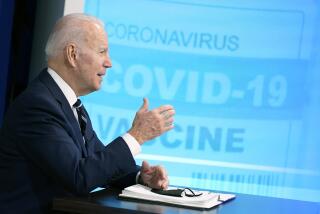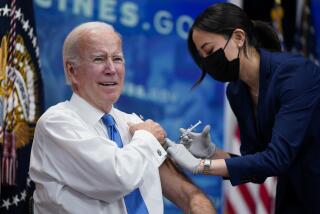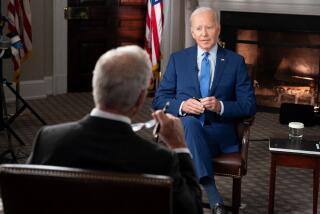Biden says COVID-19 inoculations will ‘take years’ at current pace, vows a speed-up

Vice President-elect Kamala Harris on Tuesday received her first dose of the Moderna COVID -19 vaccine in front of the media as part of a growing effort to convince the American public the inoculations are safe.
- Share via
WASHINGTON — President-elect Joe Biden on Tuesday criticized the Trump administration for falling “far behind” its pledge to vaccinate 20 million people by the end of the year, and renewed his own ambitious promise to distribute 100 million shots in his first 100 days in office.
“This is going to be the greatest operational challenge we’ve ever faced as a nation, but we’re going to get it done,” Biden vowed.
In a pre-New Year’s address near his home in Wilmington, Del., he pleaded with Americans to step up their vigilance against COVID-19, warning of bleak weeks ahead as the nation’s death toll rises. Just days after President Trump signed a $1.4-trillion relief package, Biden said he would seek more money from Congress to put children in school next fall and increase vaccine production and distribution to fulfill his 100-days promise.
His goal of 100 million shots would vaccinate about 50 million people, given the need for each person to get two inoculations. Biden said the country would need to vaccinate people at five or six times the current rate to meet that promise. At the current pace, he said, “It’s going to take years, not months, to vaccinate the American people.”
It is unclear how far behind the Trump administration is in its own goal, in part because state and local governments have not fully reported their progress. Trump had previously promised to distribute 100 million doses by year’s end.
The Centers for Disease Control and Prevention reported that 11.4 million doses had been distributed to American healthcare providers as of Tuesday but only 2.1 million people had actually been given the shot. Spokespeople for the Trump administration’s coronavirus task force did not immediately respond to a request for comment.
In addition to seeking unspecified billions of dollars from Congress, Biden said he would use presidential authority to curb the disease’s spread. For example, he said he would dispatch mobile units to isolated communities and initiate public-education campaigns to do “everything we can to show vaccines are safe,” and to overcome skepticism in Black, Latino and Native American communities, which have histories of mistreatment by the medical establishment.
As part of that effort, earlier on Tuesday Vice President-elect Kamala Harris was inoculated with the first of two Moderna doses at a hospital in the heart of Washington’s Black community.
Biden said he would use the Defense Production Act to force companies to produce more vaccine supplies and protective gear, and would require that masks be worn in federal facilities and during interstate travel on airplanes. He said he would ask mayors and governors to impose their own mandates.
“Masking has been a divisive issue in this country, but COVID is a killer in red states and blue states alike,” he said. “It’s one of the easiest things we can do to make a huge difference to save lives.”
Harris, who said she “barely felt” the COVID-19 vaccine shot in her left arm, deliberately chose Washington’s only public hospital, United Medical Center, because it serves neighborhoods in the city’s Southeast quadrant that are predominantly Black.
Get our L.A. Times Politics newsletter
The latest news, analysis and insights from our politics team.
You may occasionally receive promotional content from the Los Angeles Times.
“I want to remind people that right in your community is where you can take the vaccine, where you will receive the vaccine, by folks you may know, folks who otherwise are working in the same hospital where your children were born, folks who are working in the same hospital where an elderly relative received the kind of care they needed,” she said. Harris praised the nurse who gave her the shot in a small auditorium before reporters, hospital workers and administrators.
Harris, 56, is not in a high-risk group like Biden, 78, who was vaccinated last week, or Trump, 74, who has not been vaccinated but previously contracted the virus. As the first woman of color elected to national office, Harris saw the inoculation as an opportunity to help educate the public about the safety of the vaccines. Also, public health authorities recommended she receive the vaccine as the person who will be first in the line of presidential succession after she and Biden are inaugurated next month.
A Pew poll released this month found that only 54% of Black adults said they would definitely or probably get the vaccine if available, a lower rate than among white and Latino Americans (74% for both).
The low acceptance rate was reflected among people who work at the hospital where Harris was vaccinated. Just over 50% of the employees, about 500, have so far agreed to take the vaccine, according to Dr. William Strudwick, the hospital’s chief medical officer. That number has been increasing with education and the help of influencers within each department, he said.
Strudwick said he is hopeful that Harris’ public inoculation will “influence people in this neighborhood and convince them that it is safe and effective.”
Harris’ husband, Doug Emhoff, was also vaccinated at the hospital but did not get his shot in front of reporters.
More to Read
Get the L.A. Times Politics newsletter
Deeply reported insights into legislation, politics and policy from Sacramento, Washington and beyond. In your inbox three times per week.
You may occasionally receive promotional content from the Los Angeles Times.











